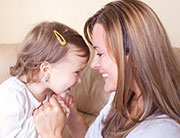
FRIDAY, June 13, 2014 (HealthDay News) — Having the television on while you play with your toddler could hinder the child’s language development, according to a new study.
Researchers observed interaction between 49 parents and their toddlers, aged 12, 24 and 36 months, as they played together for an hour. During half of that time, a TV program with content for older children and adults was on in the background.
The number of words and phrases, including the number of new words, spoken by parents was lower when the TV was on than when it was off, the study found.
This suggests that the parents were paying attention to the TV even if their children weren’t, the researchers said.
The length of phrases spoken by parents was not affected by background TV.
The findings are important because American children younger than 2 years are exposed to an average of 5.5 hours of background TV a day, according to the authors of the study published June 11 in the Journal of Children and Media.
“Our new results, along with past research finding negative effects of background TV on young children’s play and parent-child interaction, provide evidence that adult-directed TV content should be avoided for infants and toddlers whenever possible,” said study author Tiffany Pempek in a journal news release. Pempek is an assistant professor of psychology at Hollins University in Roanoke, Va.
“Although it is impractical and probably not desirable for parents to play with their young child all of the time, children do benefit greatly from active involvement by parents during play. Ideally, parents should play with their child without the distraction of TV in the background,” she advised.
Children younger than 24 months should not watch TV or have any other screen time, according to the American Academy of Pediatrics.
More information
The American Academy of Pediatrics has more about toddler language development.
Copyright © 2026 HealthDay. All rights reserved.

